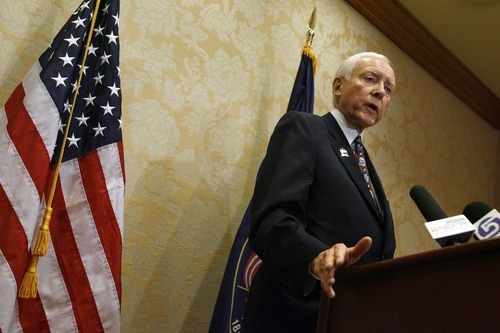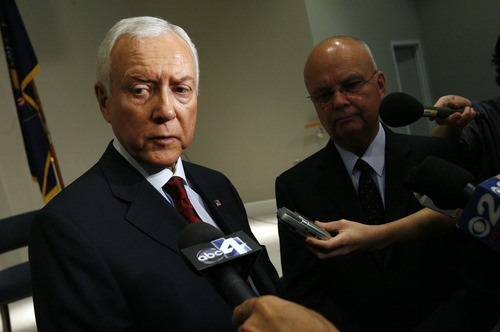This is an archived article that was published on sltrib.com in 2011, and information in the article may be outdated. It is provided only for personal research purposes and may not be reprinted.
The ongoing slaughter in Mexico's drug war is one of the five biggest security threats to the United States, former CIA Director Michael V. Hayden told a crowd of more than 200 in Salt Lake City on Wednesday.
Hayden was the guest of Utah Republican Sen. Orrin Hatch, who sponsored a national security forum at the Utah Capitol. The crowd included Utahns involved in national security, such as employees of federal agencies, the military and federal contractors.
Hayden held the crowd's attention with insights from his years as head of the National Security Agency from 1999 to 2005 and director of the Central Intelligence Agency from 2006 to 2008. A retired Air Force general, he is now a national security consultant with The Chertoff Group in Washington.
Besides violence in Mexico, which Hayden fears could spread to the U.S., he identified the following as top threats and issues: the war on terror, Iran and its potential to get nuclear weapons, the need to acknowledge China's changing power and cybersecurity.
The U.S., Hayden said, needs to get serious about the latter. He called the new Department of Defense Strategy for Operating in Cyberspace, released last month, "truth, goodness and beauty," but "an incredibly cautious document."
Anything offensive was left out, he feels, perhaps because the nation doesn't want to appear to be on the offensive in the cyberdomain, he said. But it's also a sign that Congress is giving the military's Cyber Command no guidance.
"Ultimately, we need to have an adult conversation about security in the cyberdomain," Hayden said.
Other highlights:
• "Every bit of the evidence was circumstantial" when special-ops forces descended by Black Hawk helicopter on Osama bin Laden's compound in May and killed the al-Qaida leader. "I can only imagine the tension," Hayden said.
• Hayden believes the president's plan to begin withdrawing troops from Afghanistan in midsummer 2012 — at the height of the fighting season — is a few months premature. But most important, he said, is that the U.S. signaled it will keep a presence in Afghanistan for years to come.
• On the evening of Sept. 11, 2001, as he watched NSA workers cover the windows of an office building with blackout curtains, he knew life had changed.
"What changed between Sept. 10 and Sept. 11 was our imagination," Hayden said. "Prior to Sept. 11, we couldn't imagine it."





